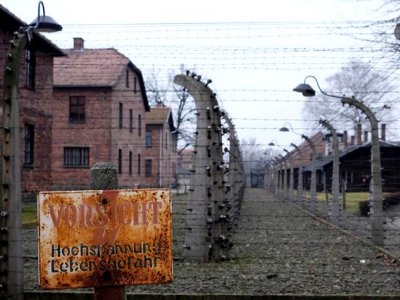
THOSE WHO DENY THE TRUTH
Holocaust denial is a nasty and pernicious belief but should it be criminalised?
This question may become acute in the years ahead as the generation of people who lived through the holocaust as victims, witnesses, perpetrators and liberators is slowly extinguished. Although we are used to relying implicitly on historical records to shape our understanding of the past, the loss of a living oral tradition is often a moment of vulnerability for the truth. The mere existence of holocaust denial while people who can vouch for the concentration camps are still alive highlights the dangers that may lie ahead of us.
The first holocaust deniers were the Nazis themselves. As the Third Reich crumbled, Heinrich Himmler gave the order to the camp commanders to destroy evidence of the atrocities they had committed. Holocaust denial remains strong today among the European far right and a number of Arab nations where access to a broad range of media is more restricted. Yet it is a non-Arab, the Iranian President Mahmoud Ahmadinejad who is the global standard bearer for the cause. He has said: ‘I will only accept something as truth if I am actually convinced of it’ – a wonderful example of post-modern thinking from a most unlikely source.
A number of continental European countries, like Germany and Austria, have criminalised holocaust denial; some others like Slovakia and Spain removed the legislation they had passed on it. Britain has desisted from putting a law on the books. The argument in favour of a law stems mainly from the concept of harm: that the holocaust was uniquely awful in its totality and that psychological distress is caused to survivors by denial. The information revolution has also made it possible for denial to flourish online and it is argued that a law against denial would raise a standard.
Those who oppose a law against holocaust denial do so mainly from the principle of free speech. In the United States the First Amendment prohibits such a law and the Supreme Court Justice Louis Brandeis has said that ‘silence coerced by the law [is] the argument of force in its worst form’. British historian Eric Hobsbawm recently observed that ‘the most underrated danger to culture is the tendency to establish historical truth, not by evidence and argument, but by law’.
I can understand why a country like Germany has opted for a law against holocaust denial but I would have reservations if Britain were to follow suit. Criminalising one form of speech begs the question why other forms of speech should not be policed also. The Holocaust is unique in a number of key historical ways but should it be afforded protection that other causes are not? Such a law may lead to other claims to censure speech in the name of equality. What criteria would then be employed to establish just cause? Once a principle like this is accepted, its logical outworking may end up taking society a long way from its original intentions.
On the other hand, libertarian arguments that all speech should be permitted is untenable in a responsible society. The way the media was used by the Hutu militia in Rwanda to defame Tutsis as ‘cockroaches’ shows us there are several limits to free speech if we wish society to be governed by a higher law. As deeply opinionated people use global networks to spread their ideas, these principles are going to be tested again and again. Wisdom is called for to enshrine history in ways that unfetter the future.
POPULAR ARTICLES

Obama's Covert Wars
The use of drones is going to change warfare out of all recognition in the next decades.

Through A Glass Starkly
Images of traumatic incidents caught on mobile phone can be put to remarkable effect.

What Are British Values?
Is there a British identity and if so, what has shaped the values and institutions that form it?


